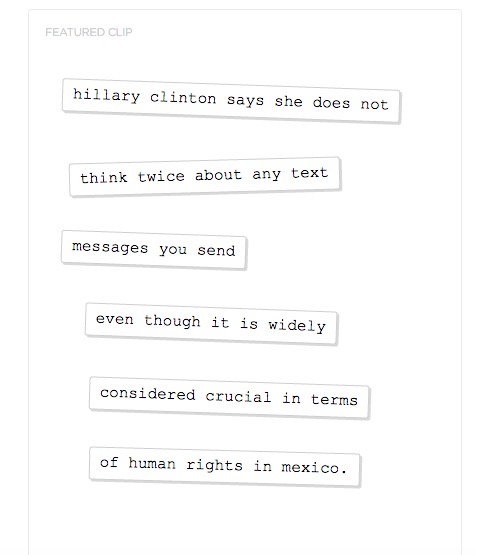Eighteen months ago Gregor Hochmuth quit his job as an engineer in San Francisco (he’s worked at Google and Instagram) and moved to New York City, the East Village to be exact, to create data art projects using technology.
His latest work — Breaking the News — relies on of six years of gathered audio from NPR newscasts, showcased through three distinct projects. Don’t Play With Your News is one of these projects — a playful yet thought-provoking look at voice and authority.
Don’t Play With Your News is the modern-day equivalent of fridge-magnet poetry.
The online game allows users to arrange short phrases from actual NPR newscasts, in any order, and then have the resulting passage read in the voice of Korva Coleman, Lakshmi Singh, Jack Speer, the late Craig Windham, Giles Snyder or Barbara Klein.
On the backend, though, it’s 58,000 broadcasts — around 4,900 hours of radio — translated by speech-to-text software and then broken into 1,148,916 clips. That’s quite a trove of data.
I’m publishing 3 new projects today, all based on over 6 years of NPR news updates: https://t.co/U5IeOMyre3 pic.twitter.com/6RWHLHzBH9
— Gregor Hochmuth (@grex) March 10, 2016
//platform.twitter.com/widgets.js
Hochmuth told Technical.ly that turning the mp3 files into readable text was certainly the “biggest hurdle” he faced with the project. He tried a variety of speech-to-text software products, and was dismayed to find that “they weren’t very good.” On the verge of giving in to a human-powered, expensive model, Hochmuth happened across one more service that, suddenly, was surprisingly accurate.
Relieved, Hochmuth turned to the next task, breaking the text into short but coherent pieces, and collecting around 150,000 of these pieces for each newsreader. And then, of course, transforming all this into something recognizable and engaging for a user.
So why did Hochmuth go to all the trouble?
“There’s something really striking about hearing a voice you know very well … saying something nonsensical,” he said. He calls this “disarming the voice” as it breaks the automatic relationship people often expect to find between a well-known, trustworthy voice and the truth. For Hochmuth, encouraging people to question the inherent authority of a voice they know is a worthwhile venture.
There’s a second philosophical strain to Hochmuth’s work, one that addresses the temporal versus eternal nature of “the news.” On the one hand, news is extremely rooted in the time in which it is produced — often “newsworthy” information is only useful or informing or even correct for mere minutes or hours after its initial creation. Because of this, going through six years of NPR newscast archives “feels like time-travel,” Hochmuth said.
But Hochmuth has also found that the news, much like that saying about history, repeats itself. Breaking news from three years ago can sound eerily familiar today, something Hochmuth discovered when he removed the element of chronology.
Now, questioning the nature of truth and authority and time and reality might be a long road to go down. But it is worth thinking, every once in a while, about what we believe and why we believe it. Don’t Play With Your News allows it’s users to do just this — in a fun, and often funny, setting.
Join the conversation!
Find news, events, jobs and people who share your interests on Technical.ly's open community Slack

DC daily roundup: Bowie State's tech transformation; Social data driving change; Ex-Foxtrot workers file suit

DC daily roundup: Appian's new AI tools; Foxtrot stores abruptly shutter; Sublime Security raises $20M

DC daily roundup: Startup founders offer praise; Howard U breaks application record; NavalX gets new director


